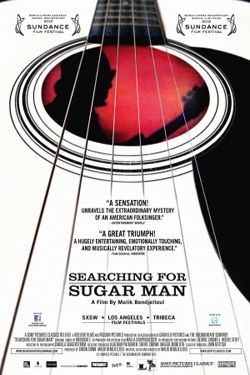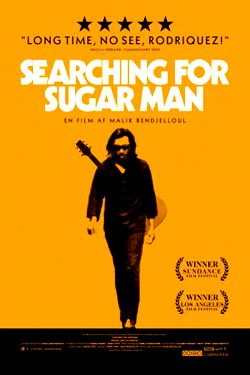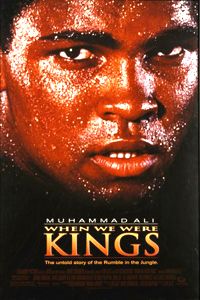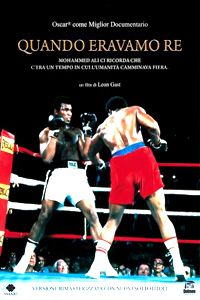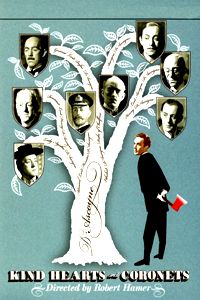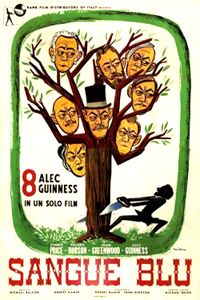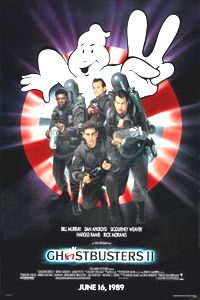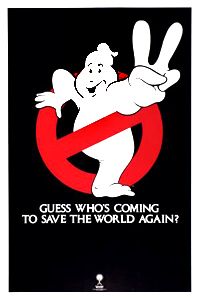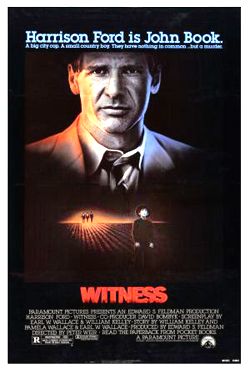
|
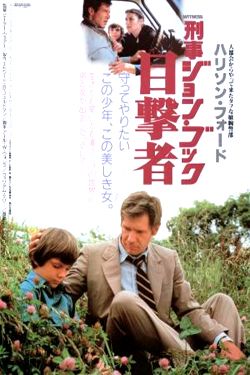
|
Year of release
1985
1985
Directed by
Peter Weir
Peter Weir
Written by
Earl W. Wallace
William Kelley
Earl W. Wallace
William Kelley
Starring
Harrison Ford
Kelly McGillis
Lukas Haas
Josef Sommer
Jan Rubes
Harrison Ford
Kelly McGillis
Lukas Haas
Josef Sommer
Jan Rubes
Witness
Plot - An Amish mother, Rachel (McGillis), takes her young son Samuel (Haas) to Philadelphia; the first time he's ever been out into the outside world. However at the train station Samuel witnesses the murder of a policeman in the toilets. Detective John Book (Ford) is assigned to the case an takes responsibility for keeping the family safe, but when it becomes clear that the men responsible were fellow cops he realises that things won't be as simple as he hoped. Now the target for the corrupt cops, Book takes off with the family and returns with them to their Amish community. To protect them Book stays with them, attempting to adapt to their strict and strange lifestyle. While there however he begins to develop feelings for Samuel's mother, and despite the restrictions placed on her by the Amish community the feelings prove to be mutual.
I feel I'm perhaps being a bit harsh with my score for this one because I can appreciate that it's a very finely crafted film, but it just didn't excite me as much as I was expecting. That may be partly on me as my idea of the film was a little off. I was expecting something more in the pure thriller mode, and in those terms I found the film to be left wanting. Surprisingly little time was actually dedicated to the thriller elements of the film, and what was failed to really break any new territory in the genre. It's the kind of scenario that's been seen countless times before - cop discovers corruption in his own department and when he tries to do something about it things are turned around so that he's the one who appears to be guilty. And of course the person he confides in turns out to be in on it! It's pretty clichéd territory.
So the thriller side of things wasn't a big hit for me. As a result the intrigue here lies in the relationships between the characters, the contrasting of worlds, the sense of community amongst the Amish people and the touching, heartfelt romance of forbidden love that is shared between the characters of Harrison Ford and Kelly McGillis. While it took a little while to win me over I was eventually able to engage with what was going on on screen
The film's cast are all uniformly excellent. Ford gives one of the most impressive performances of his career as homicide detective John Book. For someone I associate most with rather bombastic, larger than life characters (Indiana Jones, Han Solo, Jack Ryan etc) I was surprised with the depth and sensitivity he was able to imbue the character with. As such this role provided Ford with his only Oscar nomination to date. Ford is of course a screen legend; at the completely opposite end of the spectrum is Lukas Hass. As young Samuel, Lukas Haas turns in an impressive showing in his film debut. Even if he isn't asked to do a whole lot at times (indeed he only has 4 lines in the whole film) his eyes of pure innocence bring a lot to the film. For me however the star turn came from Kelly McGillis in the role of Rachel. She brought a great deal of beauty and purity to the role, initially showing herself as a strong and protecting mother who worries about Book's influence on her son, before eventually allowing out a romantic side when her attitude towards him softens. She has a sort of luminous quality to her. As the elder member of the Lapp family, Jan Rubes delivers a grand performance as the stern, but likeable Eli. He's one of those actors that just popped up every so often in a film or TV show and I was always happy to see him. A lot of that affection came from growing up with him through repeated viewings of The Mighty Ducks 2. Oh and it was fun to see Danny Glover in a rare villainous turn.
Film trivia snippets - Witness could have taken on a very different appearance had original plans worked out. The role of John Book was originally offered to Sylvester Stallone who turned it down. Stallone has been quoted as calling this the worst decision of his career. /// Witness' story was originally conceived as an episode of classic TV series Gunsmoke. Writers William Kelley and Earl W. Wallce had both been writers in the show and their original plot had Marshall Dillon travelling to an Amish farm looking for a witness to a murder.
The film features some gorgeous photography courtesy of Jon Seale which really captures the lush vistas and the rural beauty of the landscape where the Amish reside. He just allows the nature to speak for itself however, not resorting to overly glossy or stylised colour. In combination with Maurice Jarre's haunting and slightly surreal score it creates a wonderfully atmospheric vibe. They are also key components in contrasting the Philadelphia city life and the Amish's rural existence in Lancaster County. The scenes set in the Amish community have a much more languid, peaceful pace about them compared to the more frantic tone of the city; while Weir's direction and the differing aesthetics further this contrast.
The great strength of the film is to be found in its relationships. It's the romance between Book and Rachel; it's Samuel's fascination of Book's ways and the surrogate father/son bond that threatens to develop between them; it's Eli's guardian watching over both Book and Rachel, attempting to keep an eye out for both of them. Rachel is initially upset about Book's ways and how they fascinate her son, threatening his innocence. As she begins to see the kind of man he really is however a spark begins to develop. As I mentioned back at the start the thriller side of things was pretty cliched, and to an extent so is the romance between Book and Rachel. After so much cliché however I really appreciated the end of the film which brings a realistic stance to the situation.
Conclusion - A lot of care has gone into crafting this film and I was able to appreciate that. It took a while for me to really get drawn in as it wasn't the thriller I had been banking on, if anything it's a love story. However I certainly became more fond of it as it went along, and I get the feeling that will also be the case with repeat viewings. This could be a film I become a big fan of with time.
__________________
JayDee's Movie Musings (Reviews - Frailty / Total Recall / Lone Ranger / Nightcrawler / Whiplash / Imitation Game / Birdman / Avengers: Age of Ultron / Mad Max: Fury Road)
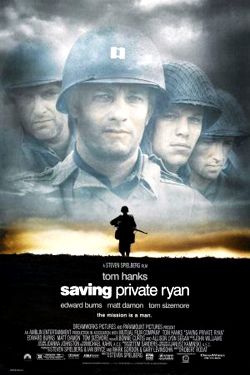
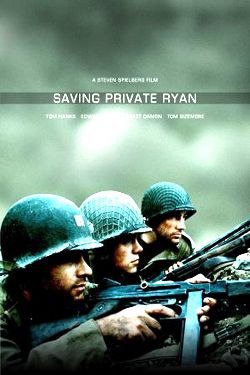


 That's it, you're banned from the thread!
That's it, you're banned from the thread!


